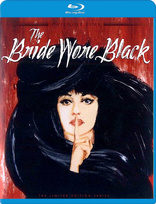The Bride Wore Black Blu-ray Movie
HomeThe Bride Wore Black Blu-ray Movie 
La mariée était en noir | Limited Edition to 3000 - SOLD OUT / Blu-ray + CDTwilight Time | 1968 | 108 min | Not rated | Jan 20, 2015
Movie rating
7.3 | / 10 |
Blu-ray rating
| Users | 4.5 | |
| Reviewer | 3.5 | |
| Overall | 3.8 |
Overview
The Bride Wore Black (1968)
Julie Kohler is prevented from suicide by her mother. She leaves the town. She will track down, charm and kill five men who do not know her. What is her goal? What is her purpose?
Starring: Jeanne Moreau, Michel Bouquet, Jean-Claude Brialy, Michael LonsdaleDirector: François Truffaut
| Foreign | Uncertain |
| Drama | Uncertain |
| Crime | Uncertain |
| Mystery | Uncertain |
Specifications
Video
Video codec: MPEG-4 AVC
Video resolution: 1080p
Aspect ratio: 1.67:1
Original aspect ratio: 1.66:1
Audio
French: DTS-HD Master Audio Mono
English: DTS-HD Master Audio 2.0 (48kHz, 24-bit)
Music: DTS-HD Master Audio 2.0 (48kHz, 24-bit)
Subtitles
English
Discs
50GB Blu-ray Disc
Two-disc set (1 BD, 1 CD)
Playback
Region A, B (C untested)
Review
Rating summary
| Movie | 3.5 | |
| Video | 3.5 | |
| Audio | 4.0 | |
| Extras | 4.0 | |
| Overall | 3.5 |
The Bride Wore Black Blu-ray Movie Review
Black and white in color.
Reviewed by Jeffrey Kauffman February 5, 2015François Truffaut’s name will probably be forever linked to Alfred Hitchock’s if for no other reason than the epochal conversations with Hitch that the French icon undertook, dialogues which are reproduced in the indispensable book Hitchcock Truffaut. It’s perhaps unfair, though, to draw parallels between the cinematic outputs of these two titans, despite the fact that even Truffaut himself evidently considered The Bride Wore Black at least a passing homage to Hitchcock. The Bride Wore Black is a rather odd film in a number of ways, one which seems to deliberately shy away from showy set pieces a la Hitch, despite some elaborately conceived murder sequences. What tends to link this film with Hitchcock’s oeuvre is a basic structural gambit where the audience is relatively quickly clued in to why Julie Kohler (Jeanne Moreau), an initially despondent young woman, goes on a killing spree, offing a handful of variously despicable men. The suspense therefore is generated not from the “why” (with perhaps one important caveat) but more from the “how,” and in this regard, Truffaut is almost slyly comic at times, building rather baroque scenarios out of what is in essence a pretty bare bones, even simplistic, revenge fantasy. The Bride Wore Black was not well received upon its initial release in 1968, and even Truffaut disparaged it, at least for a time. Truffaut apparently blamed a disconnect between the look of the film, his first French language outing in color (he had previously done the English language Farenheit 451 in color), and its emotional content. A number of personal conflicts reportedly were commonplace during the shoot, with Truffaut not seeing eye to eye with his cinematographer Raoul Coutard. The result is a somewhat disjointed feeling enterprise, but perhaps oddly that slightly lurching quality only adds to a somewhat hallucinatory, dreamlike ambience. The film remains one of the best screen showcases of Jeanne Moreau’s career, offering the iconic actress what is arguably her most memorable role outside of Truffaut’s earlier Jules and Jim.
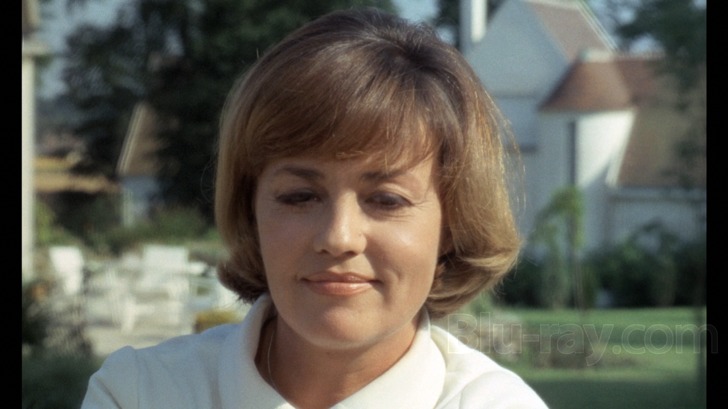
There’s the cinematic equivalent of an ellipsis early in The Bride Wore Black which in its own way is reminiscent of similar strategies employed by Hitchcock in films like Vertigo. In much the same way Hitch details Scottie Ferguson’s debilitating fear of heights early in the film and then leaves it to the viewer to infer the psychological trauma of that fear as the film progresses, Truffaut offers an opening vignette that sees Julie Kohler (Jeanne Moreau) obviously distraught about something, to the point that she attempts suicide by jumping out of a window. Julie is first seen in front of what can only be described as neurotic wallpaper, a fitting visual analog to her roiling state of mind. But then—the ellipsis. Without much in the way of explanation, Julie has calmed down and sets out on an initially undefined quest that may or may not have something to do with a quintet of neatly stacked Francs she assembles before taking off.
The ellipses continue for at least the first 35 minutes or so of The Bride Wore Black, through two seemingly random murders Julie commits after stalking two completely different men. One is a traditional cad, a womanizer and user, while the other is a potentially alcoholic milquetoast who seems to have had little or no interaction with the female species. What’s going on? At around the 35 minute mark, Truffaut finally starts to spill the cinematic beans, though even then the information is doled out in dribs and drabs, revealing a long ago tragedy in Julie’s life which has obviously caused a kind of neurotic (or even psychopathic) break. Julie, to put it bluntly, is out for revenge, and only the deaths of her nemeses will suffice.
The Bride Wore Black is one of those films that (at the least) wasn’t very well received upon its original release, but which has since been “reassessed” to the point where many consider it an unappreciated Truffaut masterpiece. Sorry to be a contrarian (what else is new?), but I think not. It’s a problematic film, one hobbled by an unwieldy structure, lapses in logic, a lack of traditional suspense and an oddly uneasy tone that almost seems to want to be (appropriately?) black comedy at times but which never quite gets there.
Once Julie’s motivations are more or less clear, there’s simply nothing more to explain or to even expect than her “checking off” the various victims names once she goes about her appointed rounds. There’s little of the psychological nuance that tends to inform other Truffaut films, despite passing attempts to give Julie some melancholic tendencies. Moreau handles scenes like Julie’s angst ridden crying fit during one of the murders with a certain amount of grace, but there’s a forced quality to the proceedings that gives the film a rather patently melodramatic air quite a bit of the time.
Still, there’s style abounding throughout this enterprise, albeit often in rather odd, even twee, formulations. After the first murder, Julie’s scarf goes for a bit of a fly over the urban cityscape in a scene that brings to mind Rosy’s parasol doing similar service on the Irish coast in David Lean’s Ryan’s Daughter. Where the Lean film seems to posit the flying object as an extension of Rosy’s seductive allure, in The Bride Wore Black it seems to be an image of some kind of psychotic break—Julie has in fact reached her tipping point, and the murders have begun. Truffaut and cinematographer Raoul Coutard are almost giddy at times with their framings (despite whatever conflicts they experienced on set). It’s also notable that several of the killings are actually not shown on screen. Instead Truffaut sets the table with all the accoutrements of the upcoming murder and then simply lets the audience infer (again, those ellipses) what has taken place.
The Bride Wore Black Blu-ray Movie, Video Quality 
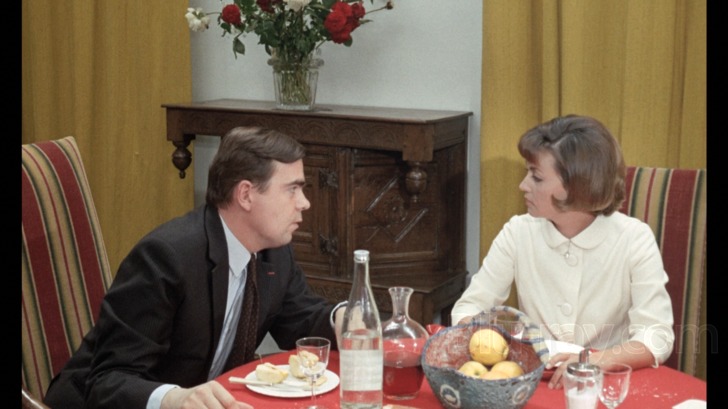
The Bride Wore Black is presented on Blu-ray with an AVC encoded 1080p transfer 1.67:1. When assessing the look of this transfer, it's important to keep in mind that (whether borne out of conflict or not) the palette in The Bride Wore Black is rather intentionally drab quite a bit of the time, albeit with little bursts of color like the bizarre blue in the wallpaper in the opening shot. Moreau is clad entirely in blacks, whites or combinations thereof, and many interior scenes have little other than a range of browns in things like paneling and even furniture. While probably not intentional, this very drabness seems to highlight by contrast the roiling emotions Julie is experiencing. While colors therefore never really "pop" in any meaningful way, they look accurately reproduced here. The grain field is quite heavy at times, especially in multi-pass opticals (as should be expected) like the little hallucination one victim experiences after having been poisoned. While clarity is appealing, sharpness can be somewhat variable, with things looking relatively soft quite a bit of the time, even in close-ups. That said, detail is typically commendable, especially in some of the more brightly lit sequences. There are no issues with image instability or compression artifacts. Elements are generally in very good condition, though there are the expected signs of age related wear and tear as well as some minimal fade.
The Bride Wore Black Blu-ray Movie, Audio Quality 
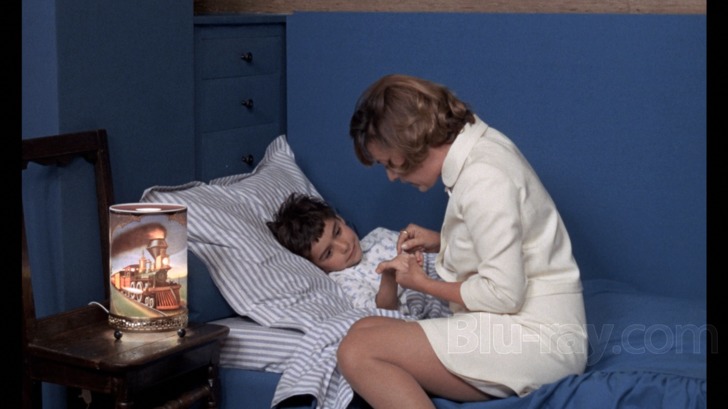
The Bride Wore Black features a lossless DTS-HD Master Audio Mono rendering of the original French language track, and a DTS-HD Master Audio 2.0 Mono version of the not very artful English dub. (My obvious recommendation is to stick with the original language track unless reading subtitles is a major distraction.) Fidelity is excellent, though a lot of The Bride Wore Black plays out sans dialogue. Bernard Herrmann's at times anachronistic score sounds great, full bodied and rather playful at times (again seeming to almost hint at a black comedic take on the subject matter, a la Chaplin's Monsieur Verdoux).
The Bride Wore Black Blu-ray Movie, Special Features and Extras 
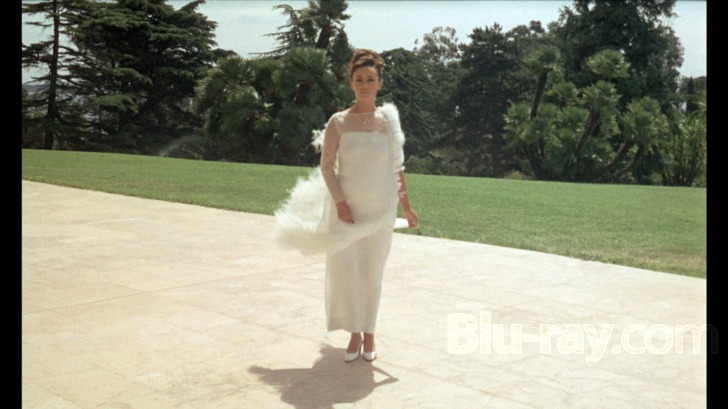
- Audio Commentary features Bernard Herrmann biographer Steven C. Smith along with Twilight Time's Julie Kirgo and Nick Redman. Kirgo and Smith provide the vast majority of the comments here.
- Isolated Music and Effects Track is presented in DTS-HD Master Audio 2.0.
- Original Theatrical Trailer (480i; 1:56)
- MGM 90th Anniversary Trailer (1080p; 2:06)
- Bonus CD offers Conversation Piece: An Unvarnished Chat with Bernard Herrmann. If you're a film music geek like I am, this will be one of your favorite supplements ever on a Twilight Time release. Herrmann is wonderfully cantankerous here, arguing with the interviewers as much as answering any questions (listen to how quickly he shuts down any suggestion that he "recycled" material). This is a real treasure.
The Bride Wore Black Blu-ray Movie, Overall Score and Recommendation 
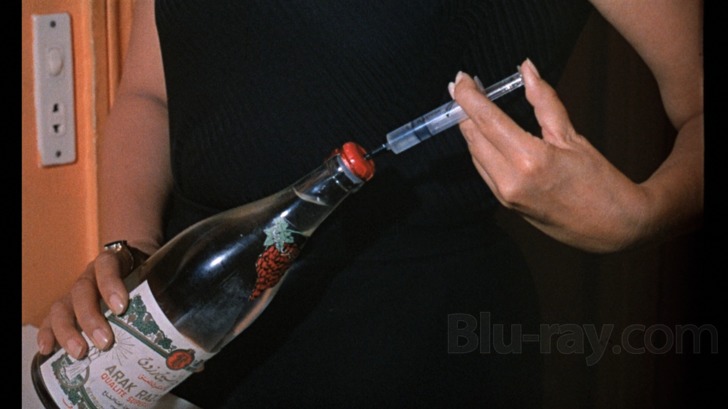
The Bride Wore Black is an odd trifle in Truffaut's oeuvre, a somewhat clunky and problematic film that may have been intended as an homage to Hitchcock, but which really succeeds more completely as a showcase for Moreau. While each murderous vignette has undeniable style, the film never builds any momentum and instead just kind of drifts from killing to killing in a curiously nonchalant way (despite Julie's occasional glimmers of conscience). It has to be remembered that even Hitch occasionally delivered an overblown turkey or two, so the fact that The Bride Wore Black stumbles occasionally doesn't necessarily mean it doesn't deliver an interesting viewing experience. This Blu-ray offers strong technical merits and the Bonus CD is worth the price of admission alone, at least for film music aficionados. Recommended.
Similar titles
Similar titles you might also like

In the Fade
Aus dem Nichts
2017

Female Prisoner Scorpion: #701's Grudge Song
1973

Female Prisoner Scorpion: Jailhouse 41
1972

Female Prisoner #701: Scorpion
1972

Beyond Outrage
アウトレイジ ビヨンド / Outrage Beyond
2012

Mustang
2015

The Marriage of Maria Braun
Die Ehe der Maria Braun
1978

Three Colors: White
Trois couleurs: Blanc
1994

Lady Vengeance
Sympathy for Lady Vengeance | Ultimate Revenge Edition | 친절한 금자씨
2005

In a Better World
Hævnen
2010

The Body of My Enemy
Le corps de mon ennemi
1976

Two Men in Town
Deux hommes dans la ville
1973

A Touch of Sin
天注定 / Tian zhu ding
2013

Outrage
アウトレイジ / Way of the Yakuza
2010

Female Prisoner Scorpion: Beast Stable
1973

Dogville
2003

Pieta
피에타
2012

Pixote
Pixote: A Lei do Mais Fraco
1980

Scum
1979

Berlin Alexanderplatz
1980
